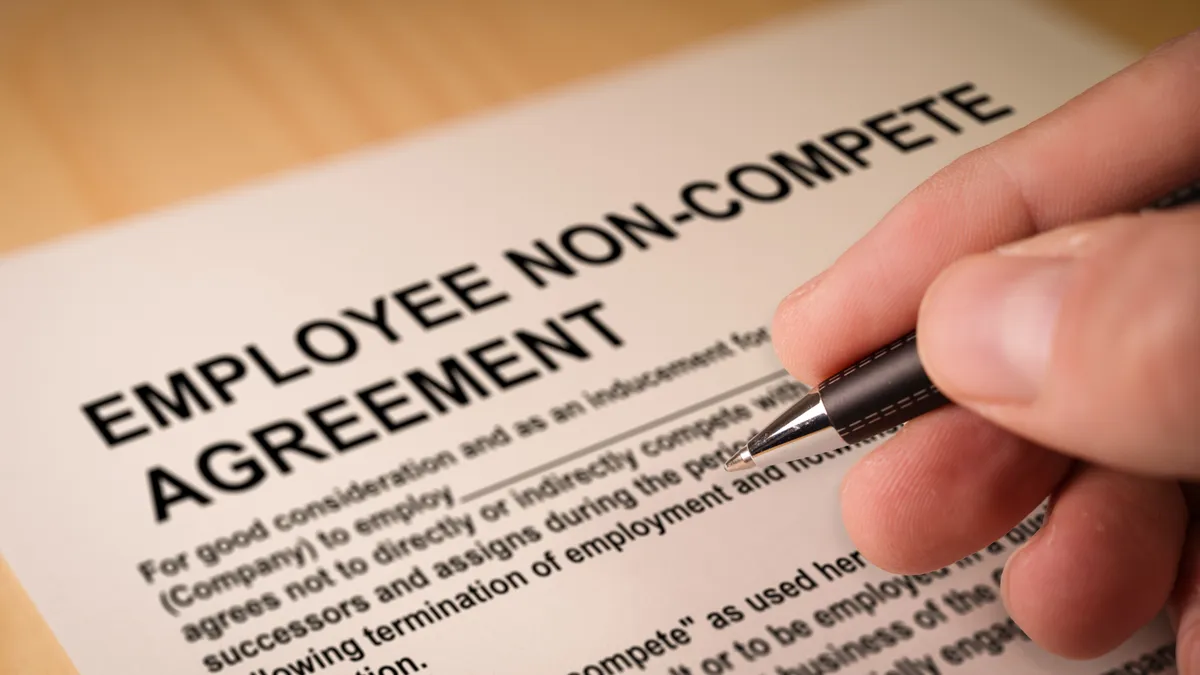New York Gov. Kathy Hochul recently indicated that she has reservations about a bill the Legislature approved that would ban noncompete agreements in the state.
Hochul, a Democrat, told reporters last week that she may be supportive of an income cap for the ban so that higher-income workers could still be subject to noncompetes.
“I have to strike the balance to make sure we take care of lower- and middle-income workers, up to, say, $250,000, and also then know that those at higher levels are very well-equipped to negotiate on their own behalf,” Hochul said, according to a report in the Times Union.
“I’m not so worried about the very wealthy, well-taken care of Wall Street, hedge fund, finance, top-paid lawyers,” Hochul added. “They can take care of themselves.”
Hochul has until the end of the year to decide whether to sign or veto SB 3100A, the bill banning virtually all noncompetes that the New York Legislature approved in June. The bill would only apply to agreements signed after the law takes effect.
Business pressure
The governor’s comments come as business groups have been making the case against the legislation, arguing in part that it could lead to businesses sending jobs to other states.
The Public Policy Institute of New York State, which is an affiliate of the Business Council of New York State, launched a $1 million ad campaign this fall warning about the legislation’s potential impact, according to the Associated Press.
Hochul told reporters recently that “I want to make sure the businesses stay (in New York),” according to the Times Union.
Business groups have urged Hochul to revise the legislation to ban noncompetes for lower- and middle-income workers but continue to allow them for higher-earning jobs, according to a report in Bloomberg Law.
A $250,000 annual income cap has been proposed by the state’s business community, the report said. The business groups would also like to see the bill permit owners and partners to sign noncompetes as part of a sale or merger of their businesses.
Push by supporters
Supporters of the ban have also been active.
State Sen. Sean Ryan, a Democrat who sponsored the legislation, participated in a press conference last week with advocates urging Hochul to sign the bill.
Among the organizations represented at the event were the National Employment Lawyers Association, the Screen Actors Guild-American Federation of Television and Radio Artists and the New York State Academy of Family Physicians.
“This is a fight between Main Street and Wall Street, and I am proud to stand on the side of the workers and small businesses on which New York’s economy is built,” Ryan said in a prepared statement.
There could be room for a compromise. Ryan has said an income gap for noncompetes was more of a concern for him than allowing noncompetes in cases of mergers and acquisitions, according to Bloomberg Law.
FTC weighs in
The Federal Trade Commission, which has proposed a national ban on noncompetes in employment, also recently sent Hochul a letter regarding the noncompete bill before her.
The letter highlights some of the FTC’s preliminary findings about noncompetes, including that they are “exploitative and coercive, both at the time of contracting and at departure, for all workers except for senior executives.”
The FTC’s letter to Hochul does not take a position on the New York legislation, but says it hopes the commission’s research and analysis concerning non-compete clauses “is valuable to you as you consider this bill.”
Employer implications
Attorneys from the Mintz law firm said Hochul’s and Ryan’s recent remarks indicate that the parties may attempt to amend the bill via so-called chapter amendments, which could result in the governor signing the legislation if revisions are made.
“Governor Hochul’s comments certainly draw a proverbial line in the sand and telegraph her willingness to sign non-compete legislation only if it strikes a balance between protecting workers and ensuring that New York remains an appealing home to industries that are, in her estimation, ‘an important part of our economy here in New York,’” the Mintz lawyers wrote in a blog post. “For now, New York employers should continue to prepare for some additional restrictions on the use of non-compete agreements, but with the expectation that the prohibition will be more limited.”











